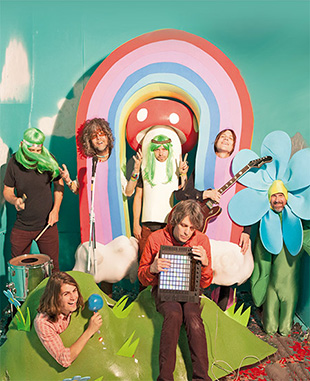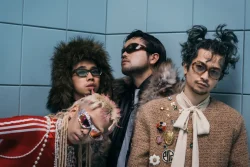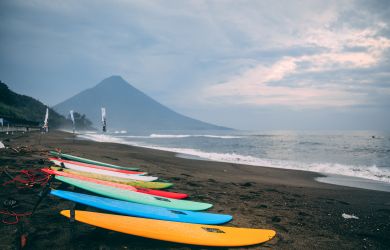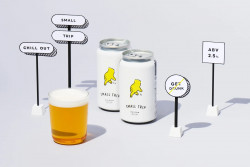
Originally published on metropolis.co.jp on July 2014

Wayne Coyne and The Flaming Lips are so inured to accusations of them selling out that they’ve even got a video online making fun of themselves for doing so. A question, then, about their current collaboration with Miley Cyrus on “Lucy in the Sky with Diamonds” is taken easily in stride.
“If you sat down with Miley for a few minutes you’d change your mind,” Coyne replies from a Wendy’s somewhere south of Buffalo. The Lips are currently polishing tracks for a Sgt. Pepper’s Lonely Hearts Club Band remake project at producer David Fridmann’s studio, where most of their albums are given their final sheen. “She’s crazy and is into all sorts of music,” Coyne adds. “Miley gets lumped in with lesser creative people. People probably think of her as a Britney Spears type but she’s really not—she’s an artist and creator.”
Coyne, 53, is a product of the 1960s, and can claim the psychedelic mantle as a native son. What does psychedelia mean to Millennials like MGMT and Tame Impala, with whom the Oklahoma-based band is working on the project? “It’s become more of a style of experimentation in art and music than people dropping acid as it was in the ’60s,” Coyne posits. “A lot of people still associate psychedelia with something like Sgt. Pepper’s, but for me it’s more of an internal curiosity and willingness to look at things in a new way.”
Coyne extends this line of thought in speaking of the Flaming Lips’ celebrated live theatrics. “When you come to our show we want you to disintegrate and to take over your being for a couple hours,” he says, “and leave you saying, ‘Oh fuck.’ We want it to be an intense experience.”
The search for transformation—for different ways of being—also led the Lips, like many rockers over the years, to the East and Japan. The Oklahoma band’s pivotal work, Yoshimi Battles the Pink Robots, is a product of this journey. “It can’t be stated enough how much Yoshimi is us being overwhelmed by the Japanese way,” Coyne says. “It’s so gentle and kind and thoughtful and intense, and if that wasn’t in the record it wouldn’t have been as rich.”
“Yoshimi [P-We] is in the Boredoms, who we were very influenced by,” he continues. “And we felt so much love from the audience in Japan—that really stuck with me. The woman the songs are about wasn’t actually Yoshimi, but someone who died suddenly—those songs helped me come to grips with that experience. It started a whole new chapter of my maturing as a musician and individual.”
1999’s The Soft Bulletin and 2002’s Yoshimi were the albums that elevated the Flaming Lips—by then a core group of Coyne, bassist Michael Ivins and multi-instrumentalist Steven Drozd—to another level of musical ambition and commercial achievement. Footage of Coyne rolling above huge crowds in his signature giant plastic bubble became a fixture of the world’s biggest rock festivals, including here in Japan.
The Lips’ success also thrust Coyne into the public eye in a way that he says sometimes leads to misunderstandings. “People think I do drugs a lot more than I do,” he laughs. “I only really do drugs to have fun. We do so many shows and everybody works so hard—for the most part we focus on getting the job done. When we’re able to get some time off to do drugs we do have fun, but we don’t do acid on a daily basis.”
Coyne says a focus on drugs gets things the wrong way around. “Everybody’s mind is always only ever altered temporarily,” he says. “Taking drugs is an indicator that you’re willing to try new things, and that’s probably why it seems more exaggerated when people who take drugs do freaky shit, because they probably would do freaky shit even if there weren’t any drugs—they just like doing freaky shit.”
More than sheer hedonism, the ethos of Coyne’s art harkens back to the formative idealism behind psychedelia—opening the mind to a better, more peaceful way of living. It’s simpler, he offers, than a cynic might suspect.
“I’m a freak in the way a lot of people wish they were a freak,” he says, “in that I can sing about the power of love and kindness and the power of friendships. Those things are difficult for us to talk about and that’s why people love music so much—because it allows folks to explore them.”
Fuji Rock Festival, Jul 27. See concert listings for details.







